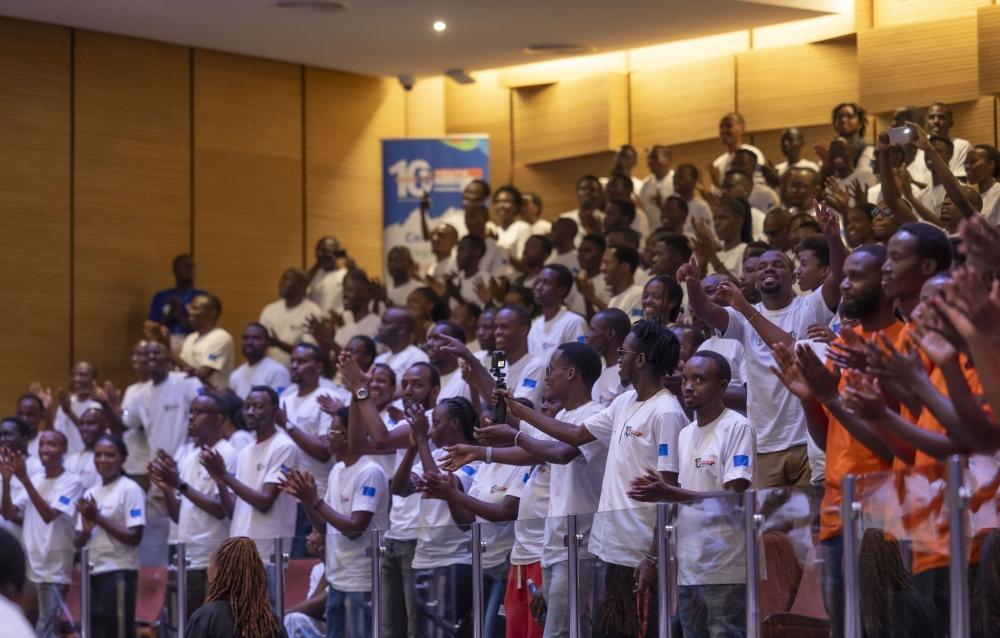Emma-Claudine Ntirenganya
Africa-Press – Rwanda. Dear Rwandan Youth,
Pericles once said “Just because you do not take an interest in politics doesn’t mean politics won’t take an interest in you”. This insight eliminates any excuse for anyone to avoid engaging in the affairs that shape our lives and the future of our nation, often referred to as ‘politics’.
For the past two decades, I have dedicated myself to family and reproductive health matters, leaving politics to the experts. However, recent developments in our country and the region have prompted me to share my layman’s perspectives, which I believe could spark some thoughts among fellow readers, especially Rwandan youth.
Were you, like me, troubled by the reckless statements made by certain regional leaders, pretending to care for Rwanda’s young people? Their misguided attempts to portray our youth as oppressed and in need of external intervention were not only baseless, but also offensive. I kept thinking about the danger of such falsehoods intoxicating unsuspecting minds and this compelled me to engage in a bit of ‘agony aunt’ talk on politics because sometimes, enough is enough.
Some might mistake Rwanda’s calm demeanour and thoughtful decision-making for passivity or complacency, but that is a great mistake. It was Rwanda’s youth who ended the Genocide in July 1994. It has been Rwanda’s youth who led the subsequent liberation struggle after the guns fell silent. Today, Rwandans under 30 years, the majority of our population, cannot be passive because, as Bruce Melody reminded us during the recent Rwanda Day, “Ni mwe Rwanda” (You are Rwanda). Just as the RPF-Inkotanyi’s youth did 30 years ago, you are now the Rwanda’s strongest pillar. You must choose your battles wisely and make no mistake about what you stand for.
Despite reports, mostly from those who have never visited our country, suggesting we do not adhere to some Western-defined scripts of democracy, we do not resort to street protests, arson, vandalism, or destruction to make our voices heard. This should not be confused with timidity, lack of awareness or unhappiness. We are a small country but not a small-minded people. We have a unique culture of which we are proud, we know how to make our voices heard, and together, we are capable of shaping the future we envision.
Perhaps our commitment to working together with our leadership for the common good might be misinterpreted, but Rwanda’s unique history has moulded our collective resilience and active participation in nation-building. Rwandans do not have to explain ourselves to anyone because we know how far we have come, where we are now, and the transformative journey we still have to make as a country, with the youth at the forefront, to earn Rwanda a brighter future.
Let me share a story. About 27 years ago, I had the opportunity to interact with a respected elder, who was well-versed in Rwanda’s history. As we returned from refugee camps and prepared to re-enter school, we participated in ‘Ingando’, the traditional civic training, to help us readjust and reflect on the core Rwandan values that shape our identity. It was then that I met Mr. Rucagu Boniface, currently a member of the Rwanda Elders Advisory Forum, who shared words of wisdom that I will never forget.
Seated under the warm sun in Nyakinama, Northern Rwanda, with his calm voice, Rucagu advised: “As a citizen, the prosperity of your country depends on your active engagement, and this is for your own good.”
This advice is particularly relevant today. The success of any leader depends on two crucial factors: having a visionary mindset and maintaining the support of the people. This combination leads to progress. Rwanda exemplifies the saying “together we stand, divided we fall”. However, does this mean we should not speak out against abuse of power, poor performance, or infringement of rights? Are we excluded from engaging in healthy debates and sometimes disagreeing with leaders or policies? Absolutely not!
Constructive criticism is an integral part of our culture and underpins initiatives such as the National Umushyikirano Council, Rwanda Day, Meet The President, various citizen outreach events, and ‘Inteko z’Abaturage’ (community meetings). It reassures our elders that Rwanda’s future is in capable hands and that the current progress will be sustained.
Drawing on our history and inspired by President Kagame, every Rwandan ought to be a critical thinker. We are not complacent; we are educated to reject mediocrity, recognising it at home and even beyond our borders, mindful of the consequences of poor governance. Accountability and ambitious thinking have been paramount in our choices and decisions. Hence, young Rwandans have a duty to boldly present your ideas, offer constructive criticism where necessary, and call out corruption. When standing for the truth, as our President has frequently stated, we should never feel the need to apologise.
We are unapologetic about standing for our unity as Rwandans, both leaders and citizens, because Rwanda is proof that the absence of unity can lead to implosion, or open the doors to external forces seeking to harm us. The saying ‘urusha nyina w’umwana imbabazi aba ashaka kumurya’ is crystal clear, particularly in the context of the reckless statements from some neighbours mentioned earlier.
Dear Rwanda’s youth, while I trust you are wise enough to reject the destructive rhetoric that undermines our unity, I also challenge you to actively shape Rwanda’s future until you can relax and feel proud of your accomplishments. President Kagame’s words during Umushyikirano 2024 resonate: “You must stand out. You must come out. You must fight for what you want to be, and what you want to have. Don’t wait for anybody to come and give it to you as a gift. Because there will be nobody who will do that. They will not show up at all, even when you badly need them.”
To Rwandan youth, from an agony aunt, Emma Claudine.
Source: The New Times
For More News And Analysis About Rwanda Follow Africa-Press






